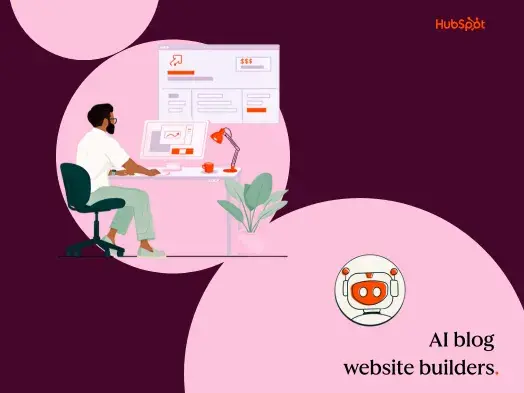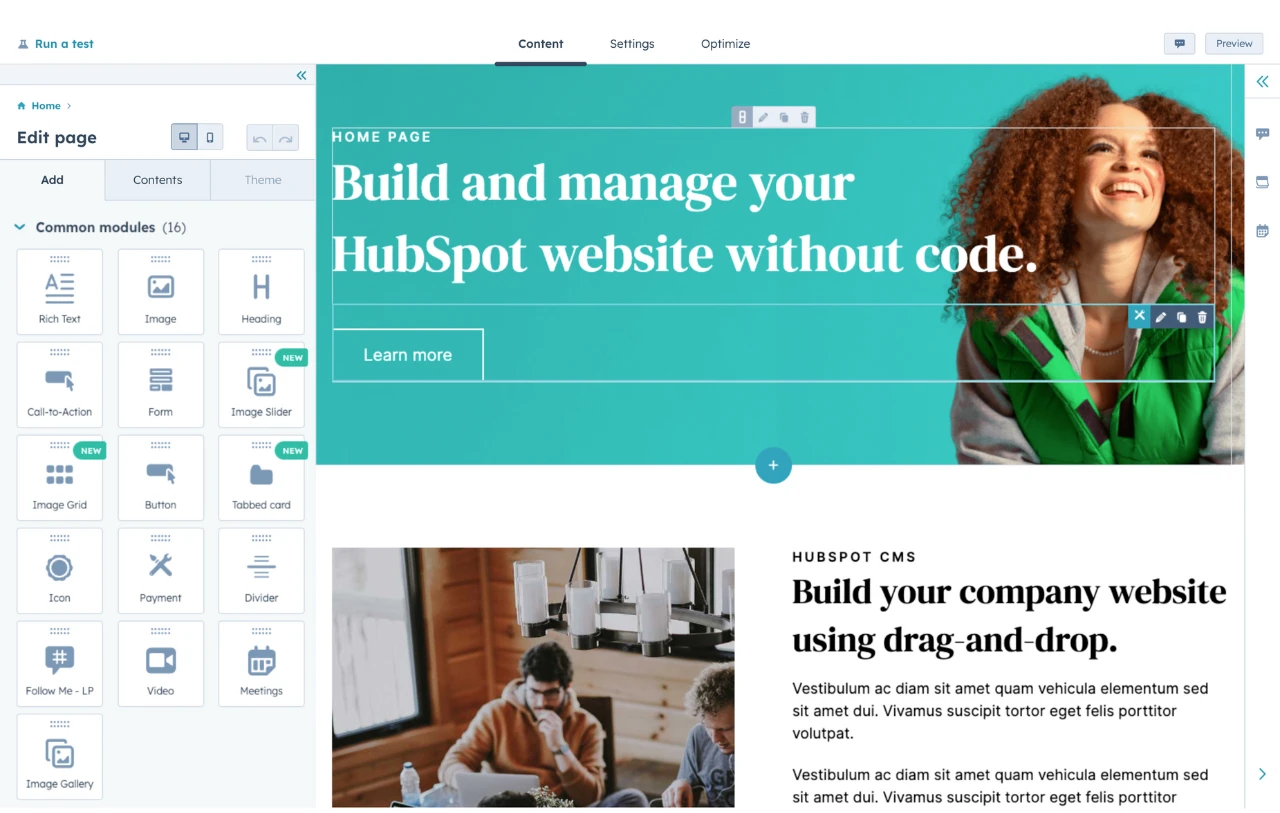Ready to see how my experiment turned out? Read on.
Table of Contents
- What is an AI blog website builder?
- Do you actually need an AI blog website builder?
- How to Evaluate an AI Blog Website Builder
- Best AI Blog Website Builders
- AI Blog Website Builder Comparison by Use Case
- Frequently Asked Questions About AI Blog Website Builders
What is an AI blog website builder?
An AI blog website builder uses artificial intelligence to generate a complete website that is made for blogging. That means the site will have a blog listings page that shows all posts in chronological order and contains blog taxonomies (such as categories and tags), authors, user roles, and version histories. Note that other general AI website builders might not be specialized for blogging.
AI blog builders might even have AI that helps you write individual blog posts, including text and image generation. However, it’s still critical that a human reviews all content before publishing. AI is notorious for hallucinating (outputting false information), so you need to verify that what it wrote is true. Additionally, AI-generated images still have a long way to go, and I view them as placeholders — not publishable photos.
HubSpot’s free AI website generator can create a one-page website for you. Plus, it comes with a feature that uses AI to learn your brand voice and apply it consistently across blog posts. Try it for free.
Do you actually need an AI blog website builder?
The alternative to an AI blog website builder is a traditional website builder that provides premade website templates that you can then customize using a no-code editor. So, which is better for you? Here’s a quick breakdown.
|
AI blog website builder |
Traditional website builder |
|
Uses artificial intelligence to generate a complete design and website based on your prompts |
Provides lots of professionally designed website templates that you can then customize using a no-code editor |
|
Better if you have an exact vision you can describe in natural language to the AI |
Better if you’re more flexible and would rather look at templates until you see one you like |
|
Provides AI-generated text and images (but you still need a human to review all of this, and you probably will need to replace the AI-generated images with real ones) |
Comes with filler text and stock images that you must then replace |
|
Generally faster at getting you a functioning website, but you still need to review all content and make changes |
Generally takes more time, since you need to look through templates and customize them |
Want a platform that provides you with both an AI website builder and a traditional CMS? Content Hub has a free AI website generator, plus hundreds of website templates if you’d rather go that route. Even better, it comes with a built-in CRM and marketing tools to ensure the ultimate personalization and ROI.
How to Evaluate an AI Blog Website Builder
Content and SEO Readiness
Unlike other webpages, a blog post needs taxonomy, including categories and tags, to keep your posts organized. You’ll also want to check if the AI blog website builder supports structured data (Schema markup), sitemaps, bulk 301 redirects, and SEO guidance.
Note: If you’re not a web developer and you’re trying to build a blog website with AI, I do not recommend using an AI “vibe coding” tool, like Loveable or Bolt.new. They do not come with a built-in CMS, so adding new blog posts might be challenging. You would need to carefully prompt the AI to build out a blog taxonomy, which may or may not work well.
AI Content Quality and Governance
If you’re going to do AI blog creation (using AI to assist you in writing the actual blog posts), you need to check what kinds of features support this. Does the AI blog website builder have built-in AI content and quality governance tools? For example, Content Hub has brand voice features, where you can train AI to understand your brand voice and then apply it across your content. Not all AI blog builders do that.
Additionally, look for AI assistants that can give you feedback on your writing or revise your content. HubSpot’s AI content tools can generate and revise content for you, but more importantly, help you create an AI blog creation workflow that keeps humans in the loop.
Lastly, check if the AI blog website builder comes with content/editorial approvals, where an editor or reviewer must approve a post before it can be published.
Integration with CRM, Email, and Analytics
As a blogger myself, I can tell you what a headache it is to have three different pieces of software to run one blog. It’s best if you can find an all-in-one platform that hosts all of your customer data as well as your blog. For example, HubSpot is a unified customer platform with a native CRM and AI website builder. With HubSpot’s Content Hub, you can build your site, add new blog posts, manage your customers, personalize your email marketing, and more — all in the same place.
Collaboration, Roles, and Permissions
Check if the AI blog website builder enables multi-author workflows, where you can create multiple author profiles, see older versions of each draft (and restore to a previous version, if needed), and approve posts before publication. This is especially important for enterprise blogs that have multiple staff writers, editors, and guest writers/freelancers contributing to the publication.
Extensibility and Ecosystem
You don’t just want an AI blog website builder that generates a website and leaves you stuck; you want one that can grow with you. Check how many plugins the website builder has. Plugins can add new features that didn’t come with the blog at first. And if you’re a developer or have one on your team, check if the website builder has an API and extensive documentation in case you need to modify the platform to better suit your needs. Lastly, if you plan on selling through your blog, check for the website builder’s ecommerce features, including whether you can sell memberships or online courses through the platform.
Security, Reliability, and Support
Check the uptime of the AI website builder’s web hosting to ensure your site isn’t constantly down. You’ll also want to ensure it doesn’t get hacked by checking its security measures. Be sure to look for whether the web host does automatic backups so you can restore your site if an update goes wrong for some reason. And lastly, check its technical support. Does it offer live chat, phone, or email support? Is it 24/7 or does it have limited hours?
Total Cost of Ownership
I hate to say it, but running a website can come with a lot of hidden costs. Here are just some of them:
- Custom domain
- Website builder subscription
- Hosting
- SSL certificate
- Domain privacy
- Seat limits
- Add-ons
- Tool sprawl
- Migration costs
For example, you might find a free AI blog website builder, but then you still need to pay annually for a custom domain.
Best AI Blog Website Builders
I tested AI blog builders by providing them all with the same prompt. I then played around with their dashboards and no-code editors.
The prompt, which I asked ChatGPT to help me with:
“Build a modern, SEO-friendly blog website for a digital marketing agency called DigitalEdge. The site should include a home page, blog index, individual post templates, an About page, and a Contact page with a lead form. The design should look professional, fast, and mobile-friendly.”
Let’s see how they did.
1. HubSpot: Best AI Blog Website Builder for Enterprise Growth
HubSpot is a unified customer platform housing CMS, marketing, sales, and service tools all in one place. It has a free AI website builder that can help you generate a one-page website and then populate that site with content thanks to its Breeze suite of AI tools.
HubSpot’s Content Hub contains a CMS, website builder, and web hosting. It’s best suited to larger teams because it has multi-author capabilities and content approvals where someone must review and approve blog posts before publication (super useful if you work with freelancers).
Most importantly, if you’re focused on business growth, HubSpot comes with a native CRM plus sales and marketing tools that help you scale your business.
HubSpot Scorecard
|
Criteria |
Rating |
Highlights |
|
Content and SEO readiness |
4/5 |
Advanced SEO recommendations, full site auditing, mobile optimization, multi-language content, SEO analytics, automatically adds live HubSpot blog posts to your sitemap |
|
AI content quality and governance |
5/5 |
AI assistants, AI image generator, AI translation, AI text generation, define brand voice, apply Brand Identity, has audit logging, content approvals, and content versioning |
|
Integration with CRM, email, and analytics |
5/5 |
Built-in CRM, email marketing, and analytics tools |
|
Collaboration, roles, and permissions |
3/5 |
Activity logging (track changes made to blogs and other content), user permission configuration, content partitioning (set which users can access which content) |
|
Extensibility and ecosystem |
3/5 |
2,000+ apps in the HubSpot Marketplace, open API, website memberships, content staging |
|
Security, reliability, and support |
5/5 |
99.95% uptime, 1:1 technical support (email, chat, and phone support), single sign-on (SSO), access controls, free SSL certificates |
|
Total cost of ownership |
3.25/5 |
Free plan available, with paid subscriptions required for advanced features. Fees for adding more AI credits to your account (starting at $45/mo for 5,000 credits/mo). Optional: If you're migrating an existing site from a different CMS to HubSpot Content Hub, you can pay for a Website Migration from HubSpot ($500 for setup, plus $20 per page). |
My Experience
HubSpot’s AI website generator lets you input a text prompt. Then, it’ll ask you to select from some options. On step two, when it asks for your goals, be sure to select “Publish a blog.”

By doing so, you should get this blog posts module automatically added to your AI-generated site:

Here’s the full HubSpot AI-generated site!

Please note that HubSpot’s free AI website generator generates a one-pager website. However, you can still create a blog in HubSpot and connect it to your AI-generated website by taking these steps:
Go to your HubSpot dashboard. Then go to Content > Blog.

In the upper right-hand corner, click the orange Create button.

Click the dropdown and click Add a blog.
Fill out the info and click Create.

On the left panel, navigate to the + icon to Add modules.

In the search bar, type “blog” and drag and drop the Recent blog posts module anywhere you’d like to put it on your website homepage.

Then, in the dropdown menu, select the blog you’d like to link to.

Any published blog posts on that selected blog will start to appear on the homepage wherever you placed the module.
Next, you need to ensure your blog has the same design as your AI-generated site.
In the left-hand menu, select Content > Blog. Click the gear icon for Settings. Go to the Templates tab. Be sure to select the correct blog from the dropdown menu.

Click Actions > Change template.

Select the name of the theme your AI-generated site is using. In my case, it’s Elevate.

Then, select the Blog post template and click Done.

Important: Click the orange Save button in the lower left corner to apply these settings.
2. Wix: Best AI Blog Website Builder for Design Variety
Wix is well-loved, especially in the non-technical or beginner website-building world. To clear up any confusion, Wix now has two AI website builder offerings: Wix AI (its original AI website builder) and Wix Vibe (a “vibe coding” type tool that lets you view and edit code).
This blog post will review the Wix AI (not Wix Vibe).
Unlike HubSpot’s AI website builder, Wix AI is more of a chat-like experience. It asks you multiple questions, so instead of one prompt, you’ll end up entering many, which can result in a more personalized website. On top of that, Wix AI lets you regenerate the design as many times as you’d like until you land on one you like. For that reason, if you’re looking for design variety, I think Wix AI is best.
Wix AI Scorecard
|
Criteria |
Rating |
Highlights |
|
Content and SEO readiness |
5/5 |
Advanced SEO tools, automated structured data markup for blog posts, blog categories, SEO Setup Checklist, SEO Assistant with tailored recommendations, Site Inspection tool, 301 redirects, server-side rendering, dynamic XML sitemaps, mobile optimization, customizable URL structure |
|
AI content quality and governance |
4.5/5 |
Astro AI assistant, AI topic brainstorming, AI outline generation, AI post creation, AI text generator with tone and voice settings, AI image creator (1,000 image limit per user), grammar and style review, content refinement tools, blog post approvals |
|
Integration with CRM, email, and analytics |
4.5/5 |
Built-in CRM, email marketing (separate paid plan for advanced email marketing), and analytics |
|
Collaboration, roles, and permissions |
4/5 |
Roles and permissions system, one free collaborator seat, invite collaborators via email |
|
Extensibility and ecosystem |
3.5/5 |
800+ apps in Wix App Market, integrates with Wix business solutions (email subscribers, pricing plans), blog subscriptions/monetization, Members Area, native ecommerce features (including inventory management), Wix Multilingual for translations |
|
Security, reliability, and support |
4/5 |
99.99% uptime, SSO support, two-factor authentication, support via Help Center, live chat, and phone |
|
Total cost of ownership |
4/5 |
Free plan available, paid plans start at $17/month billed annually, each plan valid for one site only, separate paid plan for advanced email marketing, some third-party apps come at additional costs (varies by app) |
My Experience
Wix will first ask you which one of its AI offerings you’d like to use. Select “AI website creation.”

Wix’s free AI blog website builder is a great experience. It asks more questions in the setup via its chatbot.

It’ll then send you to a dashboard, where you need to click the button that says “Design Site.” You’ll then see this page, where you need to click “Generate a Design with AI” if you want to use AI.
Wix AI generally takes 30 seconds or less to create a website, so if it’s taking longer, try reloading the page.
Pro tip: You can click “Regenerate Design” if you don't like what Wix AI created. And you can view the last five versions, so you can always revert to your favorite among the five.

I really like the design, especially the scrolling ticker that says “Marketing Tips Ahead.” However, notice that some of the AI-generated images are clearly AI — as in, the words aren’t quite right. In the hero image, the name of the blog on the website behind the headline says “Blog jutly mounts” and is very pixelated and wonky.
Another thing I didn’t like about Wix is that the brand voice is limited. You can choose from a few presets, but you can’t train the AI on your brand voice and save it to apply to future content, like you can in HubSpot.

3. WordPress.com: Best AI Blog Website Builder for Extensibility
WordPress is the most popular CMS and was originally built as a blogging platform, so it’s tough to beat if you’re purely focused on blogging. I am a big fan of WordPress’ premade themes, but if you’re set on using AI, it also has an AI blog website builder.
WordPress Scorecard
|
Criteria |
Rating |
Highlights |
|
Content and SEO readiness |
5/5 |
Automatic XML sitemap generation, automatic submission to search engines when sitemap changes, optimized for search engines, mobile optimization, blog categories and tags, SEO and analytics tools, structured data available via plugins |
|
AI content quality and governance |
4/5 |
AI assistant, AI website builder, AI image generation, AI text generation, content approvals available only via plugins |
|
Integration with CRM, email, and analytics |
3/5 |
Built-in newsletters, SEO, and analytics via Jetpack, no native CRM |
|
Collaboration, roles, and permissions |
4/5 |
User roles (administrator, editor, author, contributor, viewer, subscriber). External collaborator lets you flag users who are outside of your organization. |
|
Extensibility and ecosystem |
5/5 |
50,000+ plugins, thousands of WordPress themes, WooCommerce plugin for ecommerce, membership websites, REST API, staging site on Business and Commerce plans |
|
Security, reliability, and support |
4.5/5 |
99.999% uptime, free SSL certificates, priority 24/7 support on Business and Commerce plans |
|
Total cost of ownership |
4/5 |
Free plan available. Paid plans start at $4/mo when billed annually, custom domain included in paid plans for the first year only. Some plugins are paid. Newsletter feature available, but for more complex email marketing, you might end up paying more for a separate email marketing platform. |
My Experience

WordPress.com’s AI website builder generated a site in about a minute.

And yes, it included a blog as asked!

The WordPress AI assistant helped me with things like coming up with color palettes, removing a contact form, and generating a new hero image.

Pro tip: When you create a WordPress.com site using its AI website builder, you cannot launch the site or create a blog post without first upgrading to a paid plan. However, if you create a WordPress.com site the standard way (no AI), then you can launch the site and create new posts on the paid plan (your public domain will just be a branded WordPress subdomain, not a custom domain).
4. 10Web: Best AI Blog Website Builder for WordPress
10Web is interesting because it's a chat-based AI website builder with WordPress as the backend (so when you go to create new blog posts and make updates to content, you do it via the WordPress dashboard).
If you’re stuck between using WordPress.com or 10Web, which is powered by WordPress, here’s the tiebreaker question: Do you want a more complex website design? If so, go with 10Web. If not, go with WordPress.com.
When interacted with, 10Web’s AI-generated design was definitely the most complex and dynamic compared to WordPress.com’s AI-generated site I showed you earlier. 10Web’s AI-generated site blended parallax scrolling with fade-in and zoom-in effects that added motion to the design.
10Web Scorecard
|
Criteria |
Rating |
Highlights |
|
Content and SEO readiness |
5/5 |
AI-generated SEO optimization, 90+ PageSpeed score on mobile and desktop, SEO Assistant with AI keyword generation, WordPress CMS with blog taxonomy support |
|
AI content quality and governance |
4/5 |
AI text generation and editing, AI section generation, AI image generation, content approvals available via WordPress plugins |
|
Integration with CRM, email, and analytics |
2/5 |
No native CRM. Basic site visits stats. |
|
Collaboration, roles, and permissions |
4/5 |
User & Team Management with unlimited user invitations, real-time collaboration, WordPress user roles (administrator, editor, author, contributor, subscriber) |
|
Extensibility and ecosystem |
5/5 |
Access to over 60,000 free WordPress plugins, WooCommerce for ecommerce, Elementor-based drag-and-drop editor, code-level customization, API access, staging environment |
|
Security, reliability, and support |
5/5 |
99.9% uptime guarantee, Google Cloud hosting with isolated containers for each site, automated daily backups, free SSL certificate, malware scanning and removal, DDoS protection, firewall, 24/7 support |
|
Total cost of ownership |
3.75/5 |
Plans start at $13/mo when billed annually, free trial available, free custom domain included (first year, up to $30 value), free SSL certificate, additional costs for overages: $2 per 10K additional visitors over your plan‘s limit and $2 per additional 5GB of SSD storage over your plan’s storage space |
My Experience
10Web’s AI website builder stood out in that it showed me a detailed sitemap before it generated the actual website. This is useful in ensuring all of the pages are there and that the structure is exactly as you would like it to be.


10Web lets you edit the sitemap before it moves on to generating the design.

In less than three minutes, my blog was ready.


In the left sidebar, you can see the AI chat assistant, where you can prompt it to make changes to the site design.
Now, let me show you what I mean by WordPress being the backend. To create and edit blog posts, I use the WordPress dashboard. You can see the editor below.

When I hit publish in WordPress, it shows up in my site preview in 10Web, which you can see below.

Within the 10Web preview, you can see the “Edit in WordPress” button in the upper right corner, which will take you to WordPress.

It might be confusing for some folks to have two separate software for one blog, but I can see the advantage if you really want to have a fancier design that you can tweak with AI (which 10Web will handle for you).
5. Squarespace: Best AI Blog Website Builder for Solopreneurs
I use Squarespace for my portfolio site (but I built it using a template, not AI). In my opinion, Squarespace has the sleekest designs. When I tried its AI website builder for this post, I found that to remain true. It creates, in my opinion, the most aesthetically pleasing, modern design.
However, Squarespace has a major blogging limitation for larger teams: It doesn’t have content versioning. That means you can’t see the post’s history or revert to a previous version. When you’ve got so many blog posts and multiple writers updating those posts, this can easily become a nightmare. It would be tough to see who updated it last. But if you’re a solopreneur, this isn’t as big of an issue.
Squarespace Scorecard
|
Criteria |
Rating |
Highlights |
|
Content and SEO readiness |
4/5 |
Automated sitemap.xml generation, automatic structured data markup for some schema, mobile optimization, AI-powered SEO auditing tools, blog categories and tags, Google Search Console integration (no need to install anything) |
|
AI content quality and governance |
3.5/5 |
Blueprint AI website builder, AI-powered Brand Identity for on-brand content, AI text generation, AI Product Composer, no content versioning |
|
Integration with CRM, email, and analytics |
3/5 |
No native CRM, built-in analytics, Email Campaigns (paid add-on subscription), Google Analytics integration |
|
Collaboration, roles, and permissions |
3/5 |
Multiple permission levels, unlimited contributors on Core plans and higher two-contributor limit on Basic plan, customizable permissions per contributor but no per-page permissions |
|
Extensibility and ecosystem |
3/5 |
Squarespace Extensions marketplace, Zapier connects Squarespace forms to 1,000+ apps, API access (Forms, Orders, Inventory, Transactions APIs), memberships, limited plugin ecosystem compared to WordPress |
|
Security, reliability, and support |
4.5/5 |
99.9% uptime, free SSL certificates, DoS protection, 24/7 Security Operations Center monitoring, two-factor authentication, 24/7 support via email and X, live chat support on most weekdays, no phone support |
|
Total cost of ownership |
4/5 |
Free 14-day trial. Paid plans start at $16/mo when billed annually, free custom domain for one year with annual plans, unlimited bandwidth and storage, full Email Campaigns access requires a separate subscription. |
My Experience
Squarespace’s AI website builder isn’t prompt-driven. Instead, it guides you through a set of steps where you select from preset options.


The entire process takes less than three minutes.

Also, even though I selected “blog” from the options, Squarespace’s AI didn’t create the blog part for me, so I had to create it myself in the editor afterward.


AI Blog Website Builder Comparison by Use Case
Use Case: Agency
If you’re an agency building WordPress sites for clients, 10Web is the best because it has an agency-specific offering for a white-label AI website builder.
Use Case: Solo Creator
For a solo creator, Squarespace is a great pick because it’s easy to use, has gorgeous designs, and is built more for a single-author blog, since it doesn’t have content versioning or blog post approvals.
Use Case: SMB Marketing Team
For an SMB marketing team, HubSpot stands out as the best AI blog website builder. Not only does it have content versioning and approvals to manage a multi-author blog, but it also comes with a native CRM and marketing tools to help you grow your business. Additionally, you can use an AI blog writer in Content Hub to enhance your writing process.
Frequently Asked Questions About AI Blog Website Builders
Is there a free AI website builder for blogs?
Yes, HubSpot has a free AI website builder that can be used for a blog website. However, HubSpot’s free AI website generator creates a one-page website, and then you must add the blog part. Another thing to keep in mind is that many AI website builders offer free trials, which means they’re only free for a limited time. Be sure to look for an AI blog website builder that has a free plan, such as Content Hub or Wix. Free plans do come with limitations, though; they typically don’t have as many advanced features, do not include a custom domain, and add branding to your page.
Will an AI blog website builder help with SEO?
An AI blog website builder can help with SEO if it comes with SEO features. These features can save you time on your SEO tasks so you can spend your energy on more important things like writing good content for your readers.
Just keep in mind that those SEO features are not necessarily AI-powered. For example, Content Hub offers SEO recommendations that tell you how you can edit your page to make sure it ranks better in Google.

Content Hub also comes with Breeze Assistant, an AI chatbot that can walk you through how to use the HubSpot platform’s SEO tools.
Additionally, keep in mind that bloggers aren’t just optimizing for SEO anymore. With the rise of AI search (Google’s AI overviews, ChatGPT, Claude, etc.), you need to focus on Answer Engine Optimization (AEO) too. To see how your site is doing, check out our free AEO Grader.
How do I migrate from a basic site to a scalable platform later?
Ideally, you would not migrate later. No one sets up a website on one platform hoping to migrate it later. That’s because it takes a lot of time, resources, and money to move sites. For that reason, when you choose your AI blog website builder, be pretty sure that you’d like to stick with that platform for the long haul.
Having said that, if you do end up needing to migrate, that’s totally possible with the right planning and resources. Be sure that the platform you choose allows you to export your content and/or design. For example, Wix and Squarespace do not let you export the website’s design because that is proprietary to the platform. So if you love a design on one of those platforms, you’d have to rebuild it if you moved sites later.
How do I keep AI from hurting brand voice and accuracy?
The number one thing you can do to ensure AI doesn’t harm brand voice and accuracy is to have a human review content and make revisions as needed before publication.
Another guardrail you can put in place is to look for an AI blog website builder that comes with brand voice features. For example, Content Hub uses AI to learn your brand voice from uploaded writing samples, and you can apply it across selected content to ensure consistency.
And lastly, be sure to create centralized editorial documentation that outlines brand voice and style guidelines. You can use these to train both writers and AI to help you protect your brand voice and accuracy.
Can I connect the blog to email, CRM, and personalization later?
Yes, you typically can connect to email, CRM, and personalization platforms later, but the difficulty level varies greatly. For example, when I had WordPress blogs, I used a separate email marketing platform, Mailchimp, to manage my email newsletter. This can get out of hand if you have several standalone software tools that don’t connect with each other.
For that reason, I recommend choosing an AI blog website builder that natively connects to a CRM and email marketing platform. That way, you avoid having to move platforms and you avoid the frustration of trying to share data across different tools.
HubSpot is an all-in-one customer platform that combines an AI website builder with a CRM, email marketing tool, and sales and service software. Because all of your customer data lives in one place, you can personalize your blogs, emails, and more to better suit your audience.
Ready to create a blog with AI?
AI blog creation isn’t for everyone. Personally, I still prefer using a traditional website builder, selecting a template, and then modifying it in the visual editor. But some people prefer the speed of AI and how it can sometimes create a more specific vision they have in mind.
I hope this review of the best AI blog website builders has settled the debate for you. To get started, why not try HubSpot’s AI website generator for free? You’ll be able to edit the output with the drag-and-drop editor and enjoy the perks of an integrated CRM and marketing tools.
Website Design









![Creating a Web Design Contract That Keeps Your Project on Track [+ Expert Tips]](https://53.fs1.hubspotusercontent-na1.net/hubfs/53/web-design-contract-1-20250312-1603286.webp)

![The Podcaster's Guide to Embedding Your Show on Your Website [+Step-by-Step Tutorial]](https://53.fs1.hubspotusercontent-na1.net/hubfs/53/embed-podcast-on-website-1-20250226-2656001.webp)
